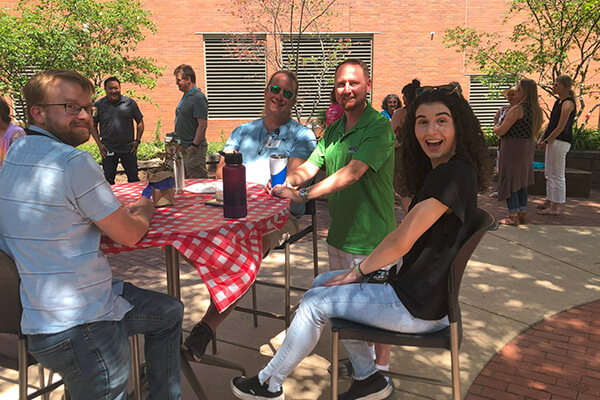
Sexual Harassment and Title IX
NWTC does not allow any illegal discrimination, harassment, intimidation, threats, or retaliation on campus or at school events. NWTC strongly opposes any form of sex discrimination or harassment, including pregnancy or related conditions, sexual orientation, and gender.
Do you think you have been discriminated against or harassed at NWTC or an NWTC event? Have you seen discrimination happen? Are you looking for more information on Title IX? On this page, you will find the tools and resources you need, whether you are a student, employee, or community member.
What is Title IX?
Title IX of the Educational Amendments Act of 1972 (amending the Higher Education Act of 1965) is the federal law prohibiting sex discrimination in educational institutions. This act is codified as Title 20, United States Code, Chapter 38, Sections 1681-1686. The act was also amended by the Civil Rights Restoration Act of 1987 ("Title IX").
The law states that "no person in the United States shall on the basis of sex be excluded from participation in, be denied the benefits of, or be subjected to discrimination under any education program or activity receiving federal financial assistance." The amendment in 1987 expanded the definition of "program or activity" to include all the operations of an educational institution, governmental entity, or private employer that receives federal funds.
Sexual Misconduct Policy and Statement
Northeast Wisconsin Technical College is bound by, and supports, all applicable laws. The Title IX of the Higher Education Act of 1972 ensures the College does not discriminate on the basis of sex in its education programs and the Campus Sexual Violence Elimination Act (SAVE) of 2013 and Violence Against Women Reauthorization Act (VAWA) ensures that colleges and universities implement policies and programs to prevent sexual assault, dating violence, domestic violence, stalking, and hate crimes.
NWTC adheres to all federal and state civil rights laws banning discrimination in public institutions of higher education. NWTC does not discriminate on the basis of political affiliation, age, race, creed, color, sex, including sexual orientation and gender identity, national origin, disability, marital status, ancestry, religion, genetic testing or other applicable legislated categories, in its services, employment programs, and/or its educational programs and activities, including but not limited to admissions, treatment and access. Moreover, NWTC provides assurances that lack of English reading/speaking skills will not be a barrier to admittance and participation in the College.
Employees and students are subject to various federal, state and local laws, which regulate civil and criminal conduct. Title IX of the Higher Education Act of 1972 (“Title IX”) prohibits discrimination on the basis of sex in education programs or activities operated by recipients of Federal financial assistance. Sexual assault and harassment are forms of sex discrimination that are prohibited under Title IX. Sexual assault is an act of sexual violence, which involves any form of sexual contact or conduct without a person's consent. Title IX and the Campus Sexual Violence Elimination Act of 2013 ensure that colleges and universities implement policies and programs to prevent sexual harassment, sexual assault, stalking, relationship-based violence, and hate crimes.
Who to Contact for Assistance
Members of the NWTC community are encouraged to direct Title IX questions, concerns, and complaints to the Title IX Coordinator(s) (listed below). If a Title IX Coordinator is alleged to be the person who engaged in discrimination or sexual misconduct, the report may be filed with another of the named offices.
Complaints can also be filed with the Office of Civil Rights (OCR). The OCR encourages reporting parties to follow the College’s process prior to filing a complaint with OCR; however, it is not required. Generally, complaints must be filed with OCR within 180 days of the alleged event. Complaints can be filed with OCR via email at ocr@ed.gov and by completing an electronic complaint form.
Statement of Parties’ Rights
The College believes everyone involved in a complaint has the right to a fair and equal resolution. Lying, changing, or misrepresenting information during the complaint process can lead to disciplinary action.
Under this Policy and procedures, the Parties have the right to:
- An equitable investigation and resolution of all credible allegations of prohibited sex discrimination, sex-based harassment, retaliation, and Other Prohibited Behaviors, when reported in good faith to NWTC officials.
- Timely written notice of all alleged violations, including the identity of the Parties involved (if known), the specific misconduct being alleged, the date and location of the alleged misconduct (if known), the implicated Policies and procedures, and possible sanctions.
- Timely written notice of any material adjustments to the allegations (e.g., additional incidents or allegations, additional Complainants) by updating the Notice of Investigation and Allegation(s) (NOIA) as needed to clarify potentially implicated Policy violations.
- Be informed in advance of any NWTC public release of information regarding the allegation(s) or underlying incident(s), whenever possible.
- Have all personally identifiable information protected from NWTC’s release to the public without consent, except to the extent permitted by law.
- Be treated with respect by NWTC officials.
- Have NWTC Policy and these procedures followed without material deviation.
- Voluntarily agree to resolve allegations under this Policy through Informal Resolution without NWTC pressure, if Informal Resolution is approved by the Title IX Coordinator or its designee.
- Not be discouraged by NWTC officials from reporting sex discrimination, sex-based harassment, retaliation, and Other Prohibited Behavior to both on-campus and off-campus authorities.
- Be informed of options to notify proper law enforcement authorities, including on-campus and local police, and the option(s) to be assisted by NWTC in notifying such authorities, if the party chooses. This also includes the right to not be pressured to report.
- Have allegations of violations of this Policy responded to promptly and with sensitivity.
- Be informed of available supportive measures, such as counseling, advocacy, health care, student financial aid, visa and immigration assistance, and/or other services, both on-campus and in the community.
- A NWTC-implemented no-contact order or a no-trespass order against a non-affiliated third party when a person has engaged in or threatens to engage in stalking, threatening, harassing, or other improper conduct.
- Be informed of available assistance in changing academic, and/or employment situations after an alleged incident of sex discrimination, sex-based harassment, and/or retaliation, if such changes are reasonably available. No formal report, or investigation, either institutional or criminal, needs to occur for this option to be available. Such actions may include, but are not limited to:
- Changing an employee’s work environment (e.g., reporting structure, office/workspace relocation)
- Visa/immigration assistance
- Rescheduling or adjusting an exam, paper, and/or assignment
- Receiving an incomplete in, or a withdrawal from, a class (may be retroactive)
- Transferring class sections
- Temporary withdrawal/leave of absence (may be retroactive)
- Campus safety escorts
- Alternative course completion options
- Have NWTC maintain supportive measures for as long as necessary and for supportive measures to remain confidential, provided confidentiality does not impair NWTC’s ability to provide the supportive measures.
- Receive sufficiently advanced written notice of any NWTC meetings or interviews involving another party, when possible.
- Identify and have the Investigator(s) and/or Decision-maker question relevant available witnesses, including expert witnesses.
- Provide the Investigator(s)/Decision-maker with a list of questions that, if deemed relevant and permissible by the Investigator(s)/Decision-maker, may be asked of any party or witness.
- Have Complainant’s inadmissible sexual interests/prior sexual history or any Party’s irrelevant character evidence excluded by the Decision-maker.
- Access the relevant evidence obtained and respond to that evidence.
- A fair opportunity to provide the Investigator(s) with their account of the alleged misconduct and have that account be on the record.
- Receive a copy of all relevant and permissible evidence obtained during the investigation, subject to privacy limitations imposed by federal and state law and be given ten (10) business days to review and comment on the evidence.
- The right to receive a copy of the Final Investigation Report, including all factual, Policy, and/or credibility analyses performed, and to have at least seven (7) business days to review the report prior to the determination.
- Be informed of the names of all witnesses whose information will be used to make a finding, in advance of that finding, when relevant.
- Regular status updates on the investigation and/or Resolution Process.
- Have reports of alleged Policy violations addressed by Resolution Process Pool members who have received relevant annual training as required by law.
- A Decision-making panel that is not single-sex in its composition, if a panel is used.
- Preservation of confidentiality/privacy, to the extent possible and permitted by law.
- Meetings, interviews, and/or hearings that are closed to the public.
- Petition that any NWTC representative in the process be recused on the basis of disqualifying bias and/or conflict of interest.
- Be able to select an Advisor of their choice to accompany and assist the party in all meetings and/or interviews associated with the Resolution Process.
- Apply the standard of proof, preponderance of the evidence (“more likely than not”), to make a Finding and Final Determination after an objective evaluation of all relevant and permissible evidence.
- Be present, including presence via remote technology, during all testimony given and evidence presented during any hearing.
- Have an impact and/or mitigation statement considered by the Decision-maker following a determination of responsibility for any allegation, but prior to sanctioning.
- Be promptly informed of the Resolution Process finding(s) and sanction(s) (if any) and be given a detailed rationale of the decision (including an explanation of how credibility was assessed) in a written outcome letter delivered to the Parties simultaneously (without undue delay).
- Be informed in writing of when a NWTC decision is considered final and any changes to the Final Determination or sanction(s) that occur post outcome letter delivery.
- Be informed of the opportunity to appeal the Resolution Process finding(s) and sanction(s), and the procedures for doing so in accordance with NWTC’s grounds for appeal.
- A fundamentally fair resolution as defined in these procedures.
Confidential Resources
What is a Confidential Resource?
Confidential resources are employees or agents, designated by the College, who are prohibited from sharing student and employee concerns regarding potential discrimination and misconduct. Healthcare professionals within Campus Care and the NWTC licensed professional counselors are confidential resources.
- Counseling services are available at all NWTC campuses upon request. Meet the NWTC Licensed Professional Counselors and learn how to set up a meeting with them.
- Bellin Campus Care: 920-498-6993; SC120
Community Resources
Community resources are available to provide support. In addition to seeking support from internal confidential resources, there are several community resources available to provide support. You can call or approach any of these people confidentially and tell them what happened. They will listen and explain your options. Talking to any of these people does not constitute reporting the incident to the College:
Sexual Assault Center - Family Services
Brown County
319 Crooks Street Green Bay, WI 54301
920-436-8899 ( 24-Hour Hotline )
Door County
207 S. 4th Avenue Sturgeon Bay, WI 54235
920-746-8996
Marinette County
1926 Hall Avenue Marinette, WI 54143
715-732-7300
Oconto County
512 Brazeau Avenue Oconto WI 54153
920-846-2111
Rainbow House
Starting January 1, 2024, now serving Marinette, Oconto and Florence Counties as well as collaborating with Safe Harbor out of Escanaba, MI to meet the needs of Menominee, MI
24 Hour crisis hotline : 1-800-956-6656
Text Line for all offices : 1-906-290-9081
Marinette Office
1530 Main Street Marinette, WI 54143
715-735-6656
Oconto Office
1008-B Pecor Street Oconto WI 54153
920-834-5299
Tri-County Safe Harbor, Inc.
Crisis Line 906-789-1166
Escanaba
905 1st Avenue South Escanaba, MI 49829
906-789-1166
Manistique
131 South Cedar Street, Suite 3 Manistique, MI 49854
906-286-4040
Menominee
601 10th Avenue Menominee, MI 49858
906-863-1116
Email: info@safe3c.com
Safe Haven
PO Box 665 Shawano, WI 54166
24 hour Crisis Line 1-888-303-3421
Text Only: 715-584-1258
24 Hour Helpline: 715-526-3421
Email: help@shawanoshelter.org
Caring House
1305 S. Prospect Ave. Iron Mountain, MI 49801
Crisis Phone 906-774-1112
Phone Toll Free: 1-800-774-1337
caringhouseim@gmail.com
Harbor House – Fox Cities
720 W 5 th Street Appleton, WI 54914
920-832-1667 or 1-800-970-1171
24 Hour Crisis Helpline: 920-832-1666
Hospital Resources in Green Bay, WI ( Find hospitals near you )
744 South Webster Avenue Green Bay, WI 54301
920-433-3500 (General)
920-445-7373 (Nurse on Call)
2845 Greenbrier Road Green Bay, WI 54311
920-288-2000 (General)
920-288-4060 (Emergency)
1726 Shawano Avenue Green Bay, WI 54303
920-498-4200 (General)
835South Van Buren Street Green Bay, WI 54301
920-433-0111 (General)
Additional Community Resources
211 Wisconsin
211 connects you with thousands of nonprofit and government services in your area. If you want personal assistance, call the three-digit number 211 or 877-947-2211. A friendly voice to talk with you 24/7/365.
Be Safe Campaign
The Be Safe Campaign seeks to enhance awareness of local domestic violence resources and is a joint effort of Golden House and the Community Coordinated Response Team – Diversity and Inclusion Committee within Brown County, Wisconsin .
Training
Training for Students and NWTC Employees
According to NWTC's mission and vision, and following federal guidelines, training has been created to stop sexual harassment, including sexual violence and sex discrimination on campus. This training is suggested for all students and all NWTC employees.
The training documents below give a general overview of Title IX and provide a link help you learn more about Title IX, your Civil Rights, and how to be an active bystander.
- Employee Training (PDF)
- Student Training (PDF)
Training record for Title IX team members
Title IX team members who are involved in the Title IX/Sexual Harassment Grievance Process participate in ongoing training in compliance with 34 C.F.R. § 106.45(b)(1)(iii) and any other applicable federal or state law. View the training log (PDF)
Contact the Title IX team

- Email:
- john.grant@nwtc.edu
- Phone:
- 920-498-6984
- Email:
- kelly.schumacher@nwtc.edu
- Phone:
- 920-498-6390
- Email:
- dawn.rentmeester@nwtc.edu
- Phone:
- 920-498-6932
